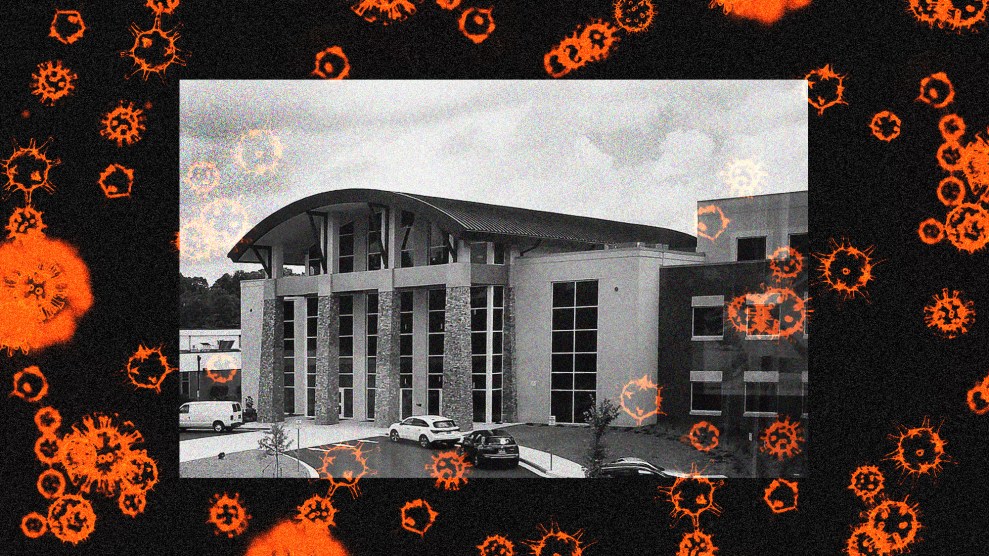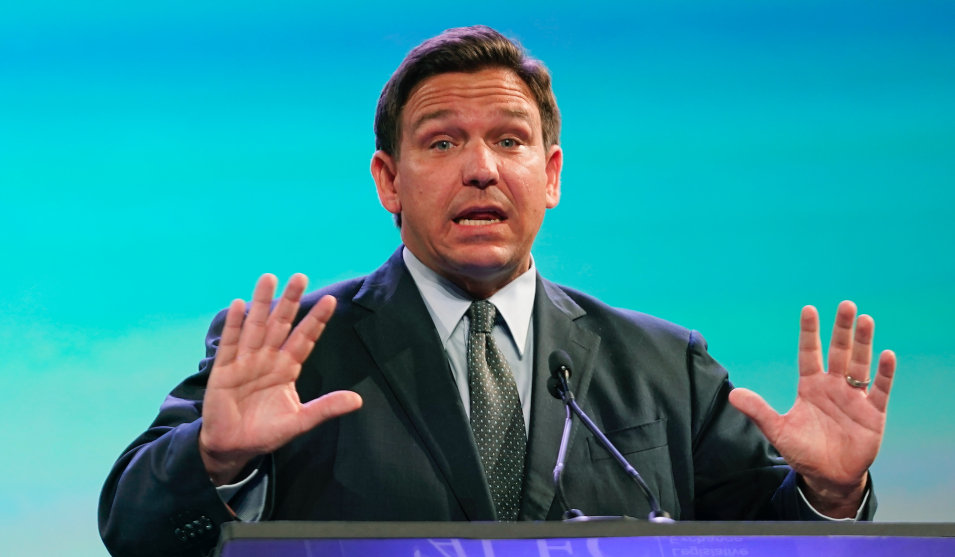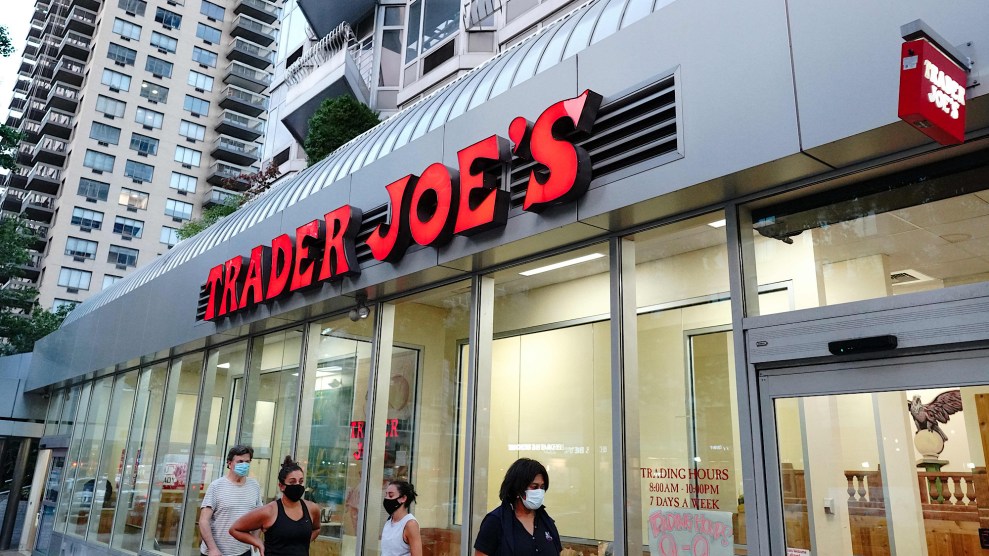
Mother Jones illustration; Hendell123/Wikimedia
Update, August 3, 2021: One of Stacy Efrat’s children has tested positive for COVID-19 after going to a middle school orientation where few attendees wore masks.
One blazing hot morning last week, Stacy Efrat pulled into the parking lot of Walton High School in Marietta, Georgia, to attend first-year orientation with her 14-year-old son a week before the official start of the school year. As they walked toward the auditorium, they took in the scene of hundreds of parents and teens filing into an imposing, state-of-the-art building with immaculate landscaping and mulch so fresh it still stunk. Efrat had been looking forward to this meeting—she was eager to learn more about the high school, one of the best in Georgia, renowned for its rigorous academics, victorious sports teams, and top-notch facilities.
As she joined the crush of families making their way through the front doors, Efrat, a vocal advocate for school COVID safety precautions, noted that only a few people were wearing masks. Surely they would put them on inside the building. But as she took her seat her enthusiasm gave way to horror: She estimated that fewer than 20 percent of the attendees were wearing masks. “I was thinking, I am literally at a super-spreader event,” she recalled. “And I can’t believe that this is going to be the scenario every single day of the school year.”
Efrat’s prediction may come true since Cobb County school district leaders have decided not to follow the latest government mask recommendations. Last week, the Centers for Disease Control and Prevention—whose headquarters is only 20 miles away, in Atlanta—updated its school mask guidance in light of the highly transmissible Delta variant that has created a spike in cases throughout the country. The CDC recommended universal masking in all educational facilities, regardless of vaccination status. That guidance, the agency later announced, was based on new data showing that even asymptomatic vaccinated people can transmit the variant. The American Academy of Pediatrics endorsed the universal school masking recommendation.
Since the new guidelines were released, many US school districts changed their school mask policies for the upcoming school year from optional to mandatory. Yet federal recommendations can go only so far since school districts are subject to state and local health department guidelines. Some districts—mostly in Republican-controlled areas—have taken what appears to be a political stance against the CDC’s advice. Last week, the New York Times reported, legislators in Florida and South Carolina announced their schools would not follow the new guidelines; the Washington Post reported that Texas Gov. Greg Abbott has threatened to fine schools that require masks.
Georgia hasn’t explicitly forbidden schools to require masks—and most metro Atlanta areas have reinstated mask mandates in advance of the new school year, which begins this week in many Georgia districts. Yet Cobb County Schools’ COVID safety plans are sparse. The district recommends social distancing in classrooms and school buildings only “when appropriate and feasible.” There’s no mention of temperature checks. School nurses can request that students showing symptoms wear masks at their “discretion,” but there are no plans for surveillance testing.
When I reached out to the administrators of Cobb County schools, they did not respond to my question about whether they had made any improvements to ventilation systems—I later heard from a school board member who told me he wasn’t aware of any such efforts—and a spokesperson did not comment specifically on the decision to keep masks optional or the district’s COVID prevention efforts. Instead, she emphasized that parents had been offered a virtual option for the coming school year. “It was important to Superintendent [Chris] Ragsdale that all Cobb families were given a choice between face-to-face and virtual classrooms for the upcoming school year,” she wrote in an email. Yet a school board member noted that parents were asked to decide last spring whether they wanted their students to enroll in in-person or virtual school for this coming school year. They aren’t allowed to change their minds, even with the recent surge in cases.
Cobb County’s blasé approach isn’t for lack of resources. Many of its 109 schools draw from affluent neighborhoods where homes can cost $1 million or more and property taxes are high. At Walton High School, for example, just 4 percent of students are economically disadvantaged. Walton’s powerful foundation, whose funds come from capital campaigns and auctions where affluent families contribute, has contributed to hiring more teachers to reduce class sizes and bankrolled online SAT prep courses for students, among other initiatives.
Throughout the pandemic, parents in wealthy, conservative enclaves—from Orange County, California, to Collier County, Florida—have been leaders in the anti-mask movement. Some community leaders worry that affluent parents’ outsized influence in rolling back mask requirements could end up hurting people who have suffered most from the effects of the pandemic. Indeed, robust data shows that low-income people and communities of color are more likely to experience severe cases of COVID and die from the disease than their white, wealthier counterparts. In several places, local chapters of the NAACP are fighting back against mask-optional policies in school. In Jacksonville, Florida, for example, the local NAACP wrote in a July 27 letter to the school board, “Too many younger, lower-income Southern kin are at the greatest risk.” A petition inspired by the letter has more than 2,000 signatures.
Tre Hutchins, a member of the Cobb County Board of Education, worries about the poorest students in his district bearing the brunt of decisions made by wealthy parents. “These factors hurt us because more parents would use the virtual options, but it’s not made available currently for enrollment,” he wrote to me this week.
Near Cobb County, some districts where resources are scarce have made investments to protect students from COVID. In Atlanta Public Schools, where three-quarters of the more than 52,000 students are economically disadvantaged, the school district plans to do weekly surveillance testing students and staff. Approximately 70 percent of students in nearby DeKalb County are economically disadvantaged, but the district has invested in upgrading ventilation in some schools. US Secretary of Education Miguel Cardona toured one elementary school there last week to see its improved HVAC system.
Patty Priven Murphy, a Cobb County mother of two, said she is angry about her district’s “reckless and irresponsible” disregard for student safety. She is anxious about her children—one of whom, at age 11, is too young to be vaccinated—returning with unmasked classmates and teachers. Murphy also worries about herself: She is immunocompromised, and she fears that one of her children could bring the virus home from school. “I could get really, really sick,” she said.
Yesterday, local media reported that several families that had attended open houses at two Cobb County elementary schools last week have tested positive for COVID-19. Attendees told Fox 5 Atlanta that hardly anyone at the events had been masked.
As Cobb County schools open their doors for the first day of school this week, Efrat finds herself increasingly nervous about the threat of COVID-19 in a largely maskless environment. She’s baffled by many of her neighbors’ choice to forego masks, even as the variant threatens to prolong the pandemic. “You’re walking into a place filled with probably the most educated people in the area, yet people are not following expert advice,” said Efrat. “I’m literally losing sleep over this every night.”















